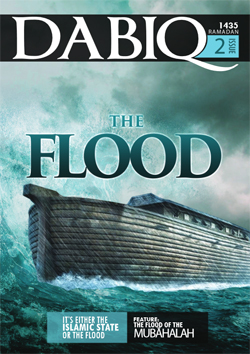Heading for Armageddon? Islamic State advances in Syria
Islamic State Twitter accounts report a major victory in Syria, bringing the jihadist group closer to the Turkish border – and an ancient town associated with the countdown to Armageddon.

Update, 14 August 2014: since this article was written it has been reported that Islamic State fighters have captured the town of Dabiq.
Accounts verified as official Islamic State accounts, those belonging to Islamic State fighters and pro-Islamic State accounts tweeted that the towns of Akhtarin, Al-Masoudiya and Turkmen Barah had been taken overnight.
Militant fighters are reported to have beaten fighters from the extremist Islamic Front and more moderate Free Syrian Army to take the towns.
The significance is how far west into Syria this puts Islamic State fighters, and how close they now are to the Turkish border.

Advancing across the west will enable Islamic State to “choke off” supplies reaching rebels across the Turkish borders. There is also speculation that foreign fighters heading to the Syrian civil war through the Turkish border will be drawn into the Islamic State’s ranks.
The advance into the north and west of Syria shows confidence and stronger control of the Islamic State’s territory, Shiraz Maher, an expert in Iraq and Syria in the War Studies department at King’s College London told Channel 4 News.
You generate large revenue if you control the border crossing. Shiraz Maher, King’s College London
The group had previously controlled a town just 20 miles from the Turkish border last year, Azaz, but was “badly beaten” by the Free Syrian Army and withdrew.
Mr Maher told Channel 4 News: “Back then they (Islamic State) were not so well connected in terms of their land, Azaz was a bit of an outpost.
“This allowed the FSA to surround them and beat them up.”
Since then Islamic State has made enormous gains in Iraq – and in doing so took large stockpiles of US-made weaponry that had belonged to the Iraqi army. This weaponry was quickly moved across the border into Syria.

Mr Maher said the militants were clever in getting the weapons out of Iraq – where it was feared they might face a Western-backed offensive in which they could lose their new arsenal – and into Syria where it was expected the US and other allies would not venture.
Since the fall of Mosul, and the subsequent international attention on Iraq, the Islamic State has made advances through northern Syria – but has also been consolidating the areas it controls.
“What they have now provides more of a corridor into the northern Aleppo countryside,” Mr Maher said. “That is important.”
It is thought that the Islamic State may now be planning a return to Azaz. If they do so they will likely capture an important border crossing at Bab al-Salam. As well as stifling supplies and gaining foreign fighters, this could also be very lucrative for Islamic State.
“You generate large revenue if you control the border crossing,” Mr Maher said. “Goods come through and the people bringing them through have to grease the palms of certain people.
“If you are at the border you can also direct those goods into your own areas.”
Armageddon
Between Akhtarin and Azaz there is another town whose significance to Islamist fighters is as much symbolic as it is strategic: Dabiq.

The town is mentioned in a hadith (report of the deeds, teachings and sayings of the Prophet Mohammed) as a place where a great battle or “malahim” will be fought between two armies.
This “malahim” is equivalent to Armageddon in Christian teachings – a battle that will herald the destruction of the world.

The importance of this is how it feeds into the romance of Islamic State’s jihadi mission. The group has used slick videos and social media to appeal to young men who believe, as Mr Maher puts it, that they are “on the cusp of history.”
This is reflected in how Islamic State’s glossy magazine, which reports victories, the destruction of shrines, and punishment of those who have not obeyed Islamic State’s interpretation of shariah law, is named after Dabiq (pictured, right).
Islamic State accounts have referred to how the “malahim” is coming, referring to the Muslim’s enemy as the armies of the West, or the US.